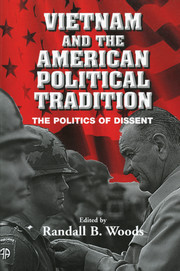Book contents
- Frontmatter
- Contents
- List of Contributors
- Introduction
- Anti-Imperialism in U.S. Foreign Relations
- World War II, Congress, and the Roots of Postwar American Foreign Policy
- The Progressive Dissent: Ernest Gruening and Vietnam
- “Come Home, America”: The Story of George McGovern
- Congress Must Draw the Line: Senator Frank Church and the Opposition to the Vietnam War and the Imperial Presidency
- Dixie's Dove: J. William Fulbright, the Vietnam War, and the American South
- Advice and Dissent: Mike Mansfield and the Vietnam War
- The Reluctant “Volunteer”: The Origins of Senator Albert A. Gore's Opposition to the Vietnam War
- A Delicate Balance: John Sherman Cooper and the Republican Opposition to the Vietnam War
- Friendly Fire: Lyndon Johnson and the Challenge to Containment
- Richard Nixon, Congress, and the War in Vietnam, 1969–1974
- Index
Friendly Fire: Lyndon Johnson and the Challenge to Containment
Published online by Cambridge University Press: 21 November 2009
- Frontmatter
- Contents
- List of Contributors
- Introduction
- Anti-Imperialism in U.S. Foreign Relations
- World War II, Congress, and the Roots of Postwar American Foreign Policy
- The Progressive Dissent: Ernest Gruening and Vietnam
- “Come Home, America”: The Story of George McGovern
- Congress Must Draw the Line: Senator Frank Church and the Opposition to the Vietnam War and the Imperial Presidency
- Dixie's Dove: J. William Fulbright, the Vietnam War, and the American South
- Advice and Dissent: Mike Mansfield and the Vietnam War
- The Reluctant “Volunteer”: The Origins of Senator Albert A. Gore's Opposition to the Vietnam War
- A Delicate Balance: John Sherman Cooper and the Republican Opposition to the Vietnam War
- Friendly Fire: Lyndon Johnson and the Challenge to Containment
- Richard Nixon, Congress, and the War in Vietnam, 1969–1974
- Index
Summary
Great legislators do not make great presidents. In fact, they rarely make presidents of any kind. The greatest senators and representatives in American history – Henry Clay, John C. Calhoun, Daniel Webster, Thomas B. Reed, Joseph Cannon, and Sam Rayburn – never reached the White House. Those lawmakers who did get there – starting with James Madison and continuing through George Bush – failed to distinguish themselves at one end or the other of Pennsylvania Avenue, often both.
There is a reason for this. The legislative mentality is not the executive mentality. If anything, the former militates against the latter. The successful legislator is an accommodator, a compromiser, a dealmaker, a person who acknowledges that in a democracy differing viewpoints can be equally valid, by the mere fact that they are held by different citizens, and for that reason must be taken into account. The successful executive, on the other hand, is a leader, a decisionmaker, a buck-stopper, a person who embodies not the least common denominator of the polity but the greatest common multiple. Executives get paid to make hard choices, legislators to prevent hard choices from having to be made.
Lyndon Johnson could have been a great legislator. He had Sam Rayburn for a tutor; more important, he had the right instincts. He delighted in discovering what different people needed from government on a particular issue, and in employing what he discovered to fashion a bill a majority could get behind.
- Type
- Chapter
- Information
- Vietnam and the American Political TraditionThe Politics of Dissent, pp. 259 - 281Publisher: Cambridge University PressPrint publication year: 2003



